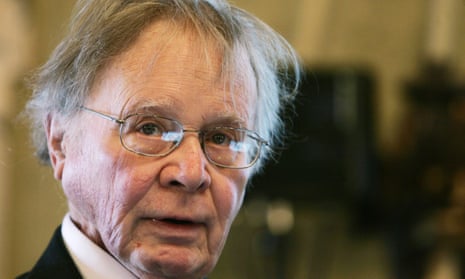A pioneering scientist who raised early alarms about climate change and popularised the term “global warming” has died aged 87.
Wallace Smith Broecker, a Columbia University professor and researcher died on Monday at a hospital in New York City, according to a spokesman for the university’s Lamont-Doherty Earth Observatory. He had reportedly been ill in recent months.
Broecker brought “global warming” into common use with a 1975 article that correctly predicted rising carbon dioxide levels in the atmosphere would lead to pronounced warming.
He was also an advocate for political action to deal with the problem. In 1984, he told a House of Representatives subcommittee that urgent action was required to halt the accumulation of greenhouse gasses in the atmosphere because the climate system could “jump abruptly from one state to another” with devastating effects. His theories have subsequently become proven by events and are almost universally accepted by climate scientists.
He was also a pioneer in radiocarbon and isotope dating and became the first person to recognise what he called the ocean conveyor belt, a global network of currents affecting everything from air temperature to rain patterns.
“Wally was unique, brilliant and combative,” said the Princeton University professor Michael Oppenheimer. “He wasn’t fooled by the cooling of the 1970s. He saw clearly the unprecedented warming now playing out and made his views clear, even when few were willing to listen.”
In the ocean conveyor belt, cold, salty water in the North Atlantic sinks, working like a plunger to drive an ocean current from near North America to Europe. Warm surface waters borne by this current help keep Europe’s climate mild.
Otherwise, he said, Europe would be a deep freeze, with average winter temperatures dropping by 20F or more and London feeling more like Spitsbergen in Norway, which is 600 miles (965km) north of the Arctic Circle.
Broecker said his studies suggested that the conveyor belt was the “Achilles heel of the climate system” and a fragile phenomenon that could change rapidly for reasons not fully understood. It would take only a slight rise in temperature to keep water from sinking in the North Atlantic, he said, and that would bring the conveyor to a halt. Broecker said it was possible that warming caused by the buildup of greenhouse gases could be enough to affect the ocean currents dramatically.
“Broecker single-handedly popularised the notion that this could lead to a dramatic climate change ‘tipping point’ and, more generally, Broecker helped communicate to the public and policymakers the potential for abrupt climate changes and unwelcome ‘surprises’ as a result of climate change,” said the Penn State professor Michael Mann.
In in his 1984 address, Broecker said the buildup of greenhouse gases warranted a “bold, new national effort aimed at understanding the operation of the realms of the atmosphere, oceans, ice and terrestrial biosphere”.
Broecker said that by dumping into the atmosphere huge amounts of greenhouse gases, such as carbon dioxide from the burning of fossil fuels, “we are conducting an experiment that could have devastating effects”.
“We’re playing with an angry beast – a climate system that has been shown to be very sensitive,” he said.
Broecker received the National Medal of Science in 1996 and was a member of the National Academy of Sciences. Among his many awards were the Vetlesen Prize in 1987 and the Tyler Prize for Environmental Achievement in 2002. He also served a stint as the research coordinator for Biosphere 2, an experimental living environment turned research lab, during which time he briefly worked under Steven Bannon, who went on to become a strategist for Donald Trump.
Broecker was born in Chicago in 1931 and grew up in suburban Oak Park. He joined Columbia’s faculty in 1959, spending most of his time at the university’s laboratory in Palisades, New York. He was known in science circles as the “grandfather of climate science” and the “dean of climate scientists”.
In the 1970s, he worked as a consultant for Exxon and wrote several papers on the effects of carbon dioxide for the oil company.
His 1975 paper “Climatic Change: Are We on the Brink of a Pronounced Global Warming?”, which predicted rising levels of carbon dioxide in the atmosphere would lead to pronounced heating of the planet. This built on earlier studies and helped to push the subject to a wider audience.
More recently, he advocated the mass deployment of carbon capture and storage technology because he felt it was already too late to rely only on a switch from fossil fuels to renewable energy, but too early to take dangerous gambles on geoengineering.
“His discoveries were fundamental to interpreting Earth’s climate history,” said Oppenheimer. “No scientist was more stimulating to engage with: he was an instigator in a good way, willing to press unpopular ideas, like lofting particles to offset climate change. But it was always a two-way conversation, never dull, always educational. I’ll miss him.”
Associated Press contributed to this report
